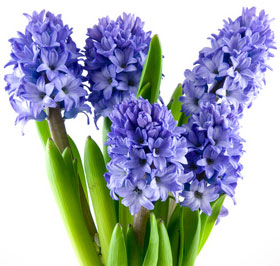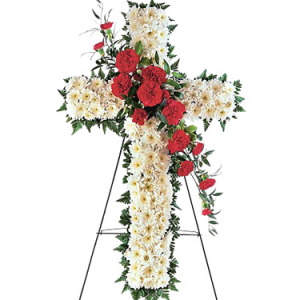When words are not enough, flowers can express the deep emotions of grief, loss, and sympathy. Throughout history, certain flowers have become symbolic of bereavement, each carrying a unique message of comfort, remembrance, and love. In this article, we explore the most significant flowers associated with bereavement and what they represent.
1. Lilies: The Symbol of Purity and Renewal

Lilies, especially white lilies, are perhaps the most traditional flower used in bereavement arrangements. They symbolize the restored innocence of the soul of the departed, making them a powerful symbol of peace and purity. In Christian traditions, the lily is also associated with the Virgin Mary, representing purity and the resurrection of the soul.
When to Use: Lilies are commonly used in both funeral services and sympathy arrangements, offering a sense of calm and serenity during difficult times.
2. Roses: Love, Respect, and Reverence

Roses are universally recognized symbols of love, but in the context of bereavement, they take on additional meanings. White roses represent reverence, humility, and innocence, making them suitable for honoring the deceased. Red roses, on the other hand, signify deep love and respect, often included in arrangements to symbolize the enduring love for the departed.
When to Use: Roses are versatile and can be included in sympathy bouquets, funeral sprays, or even as part of a casket decoration.
3. Chrysanthemums: Honoring the Life Lived

In many cultures, chrysanthemums are specifically associated with death and mourning. In Europe and Asia, white chrysanthemums are a traditional symbol of grief and are often used in funeral arrangements. They represent death, honor, and a life well-lived, making them an apt choice for honoring the deceased.
When to Use: These flowers are typically used in memorial services and funeral arrangements, particularly in countries where they are closely tied to death and mourning.
4. Orchids: Eternal Love and Beauty
Orchids are known for their exotic beauty and elegance, and in the context of bereavement, they symbolize eternal love. The delicate nature of orchids also makes them a symbol of strength and resilience in the face of loss. Commonly used colors include white, which signifies purity, and purple, which represents dignity and admiration.
When to Use: Orchids are often used in sympathy bouquets sent to the family’s home, providing a lasting reminder of your love and support.
5. Forget-Me-Nots: Remembrance and Everlasting Memory
As their name suggests, forget-me-nots are a poignant symbol of remembrance. These tiny blue flowers represent the promise of never forgetting the loved one who has passed. They are perfect for expressing a deep connection and the enduring memory of the deceased.
When to Use: Forget-me-nots are suitable for personal memorial gardens or as part of a sympathy arrangement to symbolize everlasting memory.
Choosing the Right Bereavement Flowers
Selecting the right flowers for bereavement involves understanding the symbolism behind each bloom. Whether you choose lilies for their purity, roses for their love, or chrysanthemums for their honor, each flower carries a message that words often cannot convey.
When crafting a sympathy arrangement, consider the personality and preferences of the deceased, as well as the cultural and religious context. This thoughtful approach ensures that your floral tribute is not only beautiful but also deeply meaningful.
Flowers have a unique way of conveying emotions and sentiments that words sometimes cannot express. In times of bereavement, they offer comfort, convey respect, and provide a visual reminder of the love and memories shared. By understanding the symbolic meanings behind these flowers, you can choose a fitting tribute that honors the life and legacy of the departed.
If you’re looking to send a meaningful floral arrangement during a time of loss, explore the best selection of sympathy flowers here. Their experienced florists are here to help you create the perfect tribute that will bring comfort and peace to those who are grieving.








 Fremantle is a port city southwest of Perth CBD in Western Australia. If you’re a resident of Fremantle and you wish to send a floral bouquet, finding an online flower delivery service which takes care of customers from Fremantle will be a smart way to take care of things.
Fremantle is a port city southwest of Perth CBD in Western Australia. If you’re a resident of Fremantle and you wish to send a floral bouquet, finding an online flower delivery service which takes care of customers from Fremantle will be a smart way to take care of things. Once you’ve found two or three florists which serve your city and send flowers where you need them to go (and also earn strong reviews and ratings), you’ll be ready for the next step, which is visiting the official websites of these companies. Once you’ve arrived at a florist’s website, look for the flowers that you want and then see how much they cost. Prices should be listed alongside product descriptions. Also, look for information about customer service policies and delivery fees.
Once you’ve found two or three florists which serve your city and send flowers where you need them to go (and also earn strong reviews and ratings), you’ll be ready for the next step, which is visiting the official websites of these companies. Once you’ve arrived at a florist’s website, look for the flowers that you want and then see how much they cost. Prices should be listed alongside product descriptions. Also, look for information about customer service policies and delivery fees. Show someone how much you care about them by offering them a gift of fresh flowers. It’s a great way to express yourself and your gift will always be appreciated. Flowers are natural, fragrant and beautiful. They brighten people’s lives. Whether you want to send a “get well soon” bouquet, show romantic love with red roses or express sympathy with blossoms, you’ll find that today’s florists offer the product choices and customer services that you need.
Show someone how much you care about them by offering them a gift of fresh flowers. It’s a great way to express yourself and your gift will always be appreciated. Flowers are natural, fragrant and beautiful. They brighten people’s lives. Whether you want to send a “get well soon” bouquet, show romantic love with red roses or express sympathy with blossoms, you’ll find that today’s florists offer the product choices and customer services that you need.
 The flowers really are an integral part of the whole wedding. Many people make the mistake of booking the florist last minute and ending up with arrangements that they are not completely happy with. The entire design of your wedding should be reflected in the flowers that you choose and for this reason your florist needs to be on board from the very start in order to truly realise your vision.
The flowers really are an integral part of the whole wedding. Many people make the mistake of booking the florist last minute and ending up with arrangements that they are not completely happy with. The entire design of your wedding should be reflected in the flowers that you choose and for this reason your florist needs to be on board from the very start in order to truly realise your vision. There really is no need to get separate flower arrangements made for the ceremony and the reception. The flowers decorating your ceremony venue can easily be reused for the reception. Aisle flowers can easily become centrepieces and the buffet table can be decorate with the flowers previously decorating the altar. It would be a terrible shame to see beautiful arrangements only used for such a short period of time, so save yourself money and effort by be being economical.
There really is no need to get separate flower arrangements made for the ceremony and the reception. The flowers decorating your ceremony venue can easily be reused for the reception. Aisle flowers can easily become centrepieces and the buffet table can be decorate with the flowers previously decorating the altar. It would be a terrible shame to see beautiful arrangements only used for such a short period of time, so save yourself money and effort by be being economical.





















